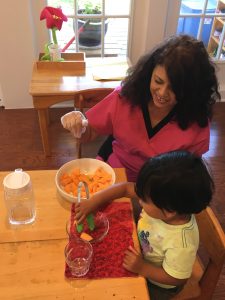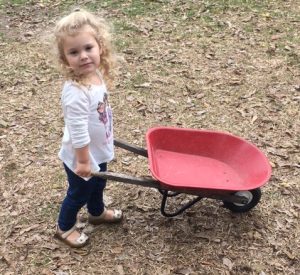TODDLERS (24 MONTHS-3 YEARS)
 The structure of the curriculum is based on five developmental areas: physical and motor skills, perceptual and sensory experiences, language, self-care skills, and social and emotional needs. Physical and motor skills are enhanced through lessons using specifically designed materials as well as directed movement activities. Toddlers absorb language as teachers speak to them in normal speaking voices, as the children interact with each other, and as they are read to aloud and given opportunities to listen to a variety of music. Self-care involves activities such as buttoning and zipping, putting on shoes, washing hands, eating and drinking at the table with dishes and silverware, and working on toilet training. Social needs are met as children interact and learn from their caregivers and their peers. This aspect of the Montessori curriculum is where multi-age grouping plays a significant role, as older students show and model behavior and activities to the younger children.
The structure of the curriculum is based on five developmental areas: physical and motor skills, perceptual and sensory experiences, language, self-care skills, and social and emotional needs. Physical and motor skills are enhanced through lessons using specifically designed materials as well as directed movement activities. Toddlers absorb language as teachers speak to them in normal speaking voices, as the children interact with each other, and as they are read to aloud and given opportunities to listen to a variety of music. Self-care involves activities such as buttoning and zipping, putting on shoes, washing hands, eating and drinking at the table with dishes and silverware, and working on toilet training. Social needs are met as children interact and learn from their caregivers and their peers. This aspect of the Montessori curriculum is where multi-age grouping plays a significant role, as older students show and model behavior and activities to the younger children.
Two categories of activities facilitate the curriculum: practical life  and sensorial. Practical life activities instill care for oneself, for others, and for one’s environment. These types of tasks are the foundation for all future academic work because they promote concentration, order, independence, and the ability to complete a full work cycle. Sensorial materials and experiences are designed to allow the child to identify, refine, and classify information received through their senses. This leads to a greater awareness of not only the child’s environment, but also their own internal physical and emotional state and needs.
and sensorial. Practical life activities instill care for oneself, for others, and for one’s environment. These types of tasks are the foundation for all future academic work because they promote concentration, order, independence, and the ability to complete a full work cycle. Sensorial materials and experiences are designed to allow the child to identify, refine, and classify information received through their senses. This leads to a greater awareness of not only the child’s environment, but also their own internal physical and emotional state and needs.
Toddlers are guided to explore and learn at their own pace so that internal desire and not external pressure facilitate their development. This will foster an appreciation for learning that will last a lifetime.
PARENT HANDBOOK
ENROLLMENT
OTHER LINKS